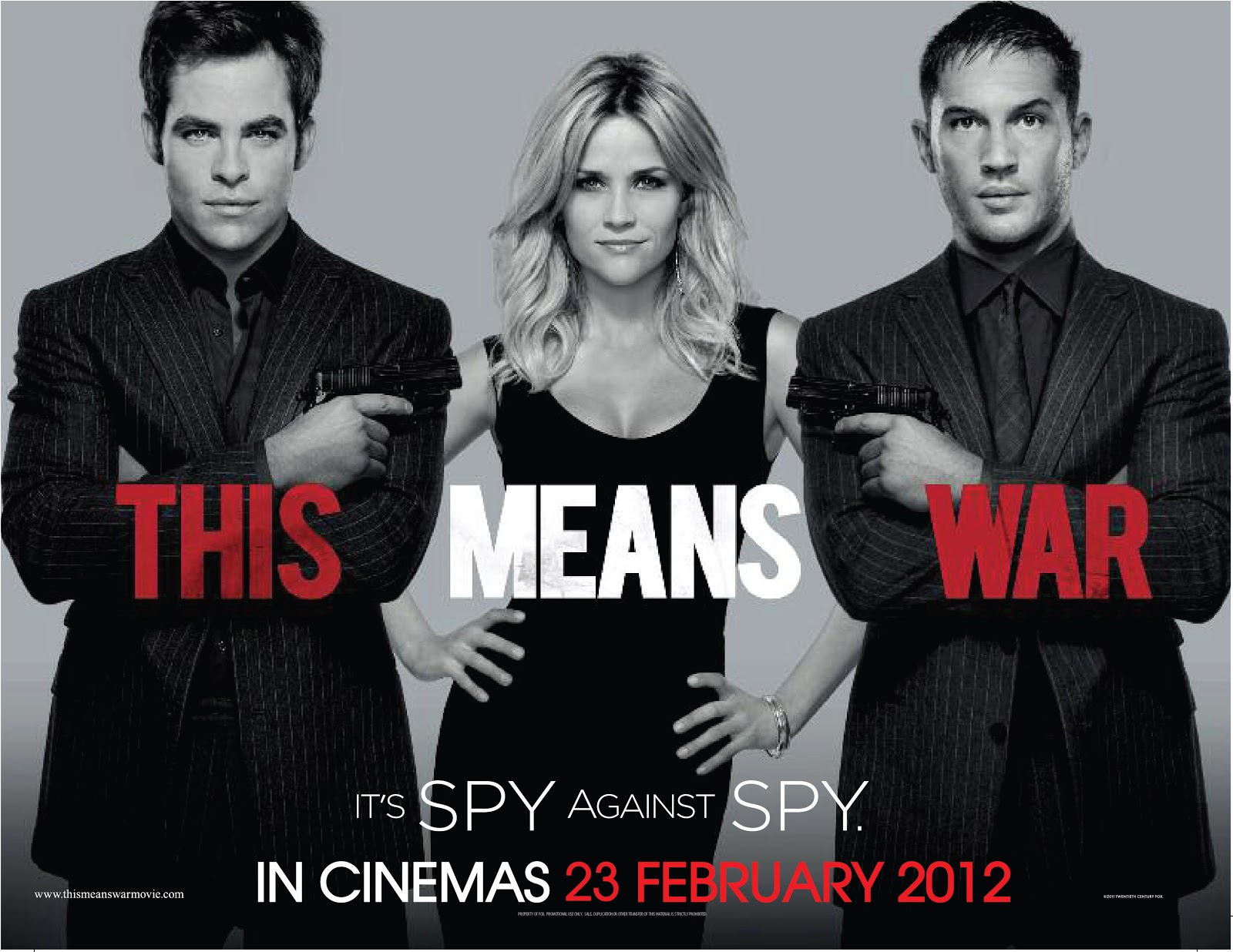A chick flick for guys too? Well certainly that is the general aim for
the post-valentine’s day release of “This Means War”. Directed by McG, “This Means War” wants to be
the ideal date movie. We have car chases, shootouts and Bourn-esque fisticuffs
for the boys and a high concept love triangle for the girls. The movie features
Chris Pine and Tom Hardy, probably most well-known to the world as the new
Captain Kirk in 2009’s “Star Trek” reboot and the anticipated villain Bane in
this summer’s upcoming “Dark Knight Rises”. Both actors share a few things in
common; neither of them are movie stars yet--despite being involved with money
making franchises--both are charismatic good looking men who haven’t really
broke into the role of the romantic lead, and lastly, both of them have some
serious nerd-cred due to their involvement in the aforementioned
franchises. So what does McG do to widen
their appeal? He has thrown them in a rom-com action highbred with Reese
Witherspoon, who has the unlucky job of bringing in the entire female portion
of the audience who has never been to Comicon.
Chris
Pine and Tom Hardy play FDR Foster and Tuck, longtime best friends who both
happen to work as special-op spies for the CIA. Reese Witherspoon plays Lauren
Scott, a single 30-something that just can’t seem to get back into the dating
world (yeah, I had a hard time with this one too). Lauren’s obnoxiously crass
and wildly intrusive sister makes her an internet dating profile, and after she
notices interest by the recently divorced and handsome Tuck (Hardy), she
decides to try it out. Not long after Lauren and Tuck’s first date she runs
into FDR (Pine) in a video store, where he tries to pick her up with his sexy
knowledge of Hitchcock movies (No, really…This is actually in the movie). It
doesn’t work but eventually he follows her to her job, where she is a product
researcher (Get it? It’s clever because she has to decide on the quality of competing
products.*wink wink*). There, he basically forces a date out of her by
threatening embarrassment. Eventually the men find out they are both trying to
date the same chick, and even though she doesn’t know they are competing for
her love, she has to pick them based on their strengths. Being trained CIA operatives who have too much money and
downtime, Tuck and FDR play a game of “Spy vs. Spy” where they use their secret-agent
training, to sabotage the each other (Yes , they play the song) while bugging
every apartment and date to glean information from Lauren to better their odds
(Nope, not creepy at all).
Making his
ridiculous name with movies like “Charlie’s Angels” and “Terminator Salvation”,
McG is the type of director who sits beside the style-over-substance and bro-centric
likes of other filmmakers such as Brett Ratner (Rush Hour, Tower Heist) and
Michael Bay (Transformers, Bad Boys). And like those guys he is the kind of
director who is loved by the studios for making disposable genre fodder that
can easily win its weekend, but who is equally hated by critics for pandering
to the lowest common denominator. “This Means War” might be his best movie yet,
and that’s not really saying much. Though the movie has its moments of pop-corn
friendly entertainment and something approximating charm, ultimately the
screenplay’s desperation to pull in both demographics leaves the characters
empty and the plot locked into a no-surprises track down cliché express.
Not too unlike the
“Twilight” franchise we have a female wish fulfillment fantasy where a rich
classy single lady has two handsome men literally fighting for her. This Lauren
character, played as well as possible by Witherspoon, becomes increasingly
unlikable as she seems quite ambivalent to the idea of lying and cheating on
both men throughout the whole movie. And as far who she picks in the end, well
I won’t spoil it, but I will give you a hint. See if you can notice which male
lead gets more screen time, more character development, and more dialogue. But
at least unlike the odious “Twilight Saga” this movie has a sense of humor
about itself, and a really good cast who does their best to elevate this
pathetically pedestrian material. In the
long run this is the type of movie that you will most likely come out of
feeling okay with because it has been carefully designed to do exactly that.
It’s a quick hour and a half of brain-candy and will be digested and forgotten
just as quickly.
Grade: C-
Originally Published by The Basic Alternative/Feb-2012

